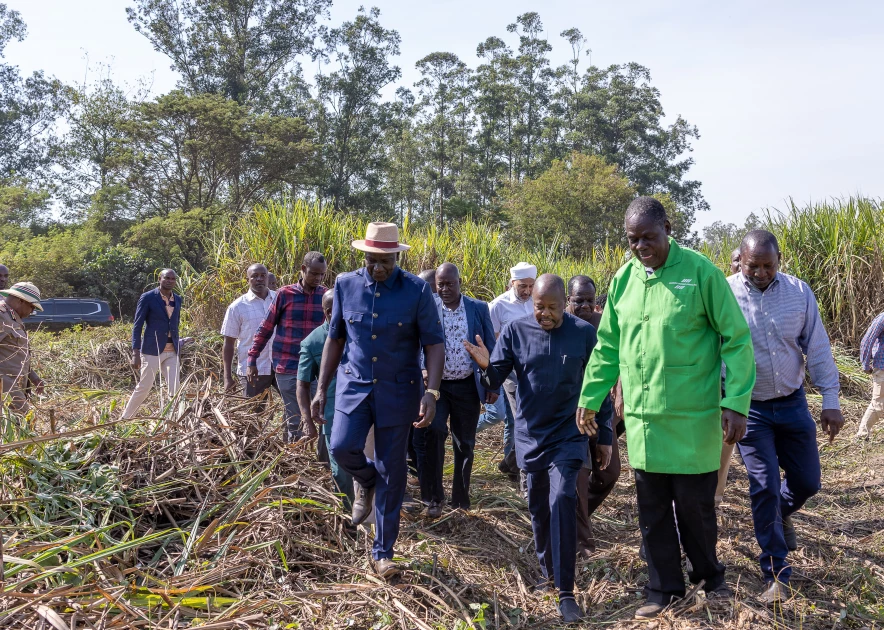Kenya's sugar high: Big boom, big profits as sugar industry is revived

President William Ruto during the launch of the issuance of bonuses for sugarcane farmers, Mumias, Kakamega County.
Farmers have endured low
pricing for their cane, delayed payments, and low production due to a lack of
concrete government subsidies, unlike other crop sub-sectors.
Politically, the sugar
sector has been a topic of endless promises and commitments to revamp its value
chain, but little tangible progress had been achieved. Almost every political
competitor in past general elections has included promises to "revive the
sugar sector," yet few of these lofty manifestos have borne fruit.
The narrative shifted on
January 20, 2025. A historic day in the agriculture calendar of the Kenya. For
the first time since sugarcane was introduced in Kenya in 1922, farmers got
bonus payments.
Looking at the faces of
the 15,846 farmers drawn from Kakamega, Busia, Bungoma and Siaya Counties who
received bonuses worth Ksh.150 million in a ceremony witnessed by President
William Ruto at the Mumias Sugar Complex Grounds, in Kakamega County, one could
clearly tell that despite the obvious joy of bonuses, the farmers were still in
shock of the sweetness of the sugar reforms that has taken over 100 years.
“With a record 832,000 tonnes of sugar produced
last year, Kenya is on course to achieving surplus production and commencing
regional exports by 2026, turning sugarcane cultivation into a viable and
rewarding venture,” President Ruto remarked as he handed cheques to the
farmers.
The President assured
farmers that reforms in the sugar sector are firmly on track, with the goal of
ensuring optimal economic benefits. He highlighted a three-pronged government
approach:
“First, we must pay the
farmers. Second, we must pay the employees. Third, we must pay their bonuses.
Today, I am here to pay farmers a bonus of 150 million shillings. You now have
money in your pockets," he said.
The hitherto
dysfunctional value chain had made some farmers contemplate shifting to other
crops and heightened the clamor for privatization of the sugar factories, a
move often exploited by sugar barons aiming to acquire mills at throwaway
prices.
It is expected that the
signing into law of the Sugar Bill at the tail end of 2024 by the President
will make sugarcane farming even sweeter, like its end product, and gradually,
farmers will reap maximum benefits from their crop. The endemic problems of
delayed payment and poor pricing have been resolved, and now the icing on the
cake is a bonus.
“This is clearly transformational,” said
Deputy President Kithure Kindiki. “We are investing in critical value chains:
agriculture, livestock, fisheries, the blue economy, and mining, where 85% of
Kenyans derive their livelihoods. Additionally, we are improving the
infrastructure that supports value chains, such as roads and electricity.
Beyond that, we are investing in the social sector through reforms in health
under Universal Health Coverage and education. These constitute the “Seven
Golden Keys” that will push Kenya from where we are today to the desired
position of a first-world nation in the shortest time possible.”
Since taking office in
September 2022, President Ruto has rolled out interventions not only in the
sugar sub-sector but also in other scheduled crops like tea and coffee. These efforts
have contributed to improved household incomes and job creation. Analysts note
that the success sugarcane farmers are enjoying is neither accidental nor
miraculous. It is the result of carefully formulated reforms and implementation
follow-up.
Key reforms include
allocating Ksh.600 million in subsidized fertilizers through the Cane
Development Fund, boosting production and reducing farming costs. Cane testing
units, similar to quality testing systems in the tea and coffee sectors, have
incentivized farmers to grow higher-quality cane.
Mechanisms for fair
competition have also been implemented, such as a policy where farmers
delivering cane to Mumias Sugar Company receive 50% of its annual rent as a
bonus based on supply. The modernization of mills has further enhanced
efficiency and sustainability.
Additionally, the
government’s debt relief of Ksh. 117 billion, which included settling farmer
and employee arrears, has restored confidence and productivity in the sector.
The reforms have also reduced sugar imports to below 10% of annual demand, with
projections indicating a surplus by 2026. This surplus will stabilize foreign
exchange and strengthen Kenya’s import cover.
Want to send us a story? SMS to 25170 or WhatsApp 0743570000 or Submit on Citizen Digital or email wananchi@royalmedia.co.ke
Comments
No comments yet.


Leave a Comment